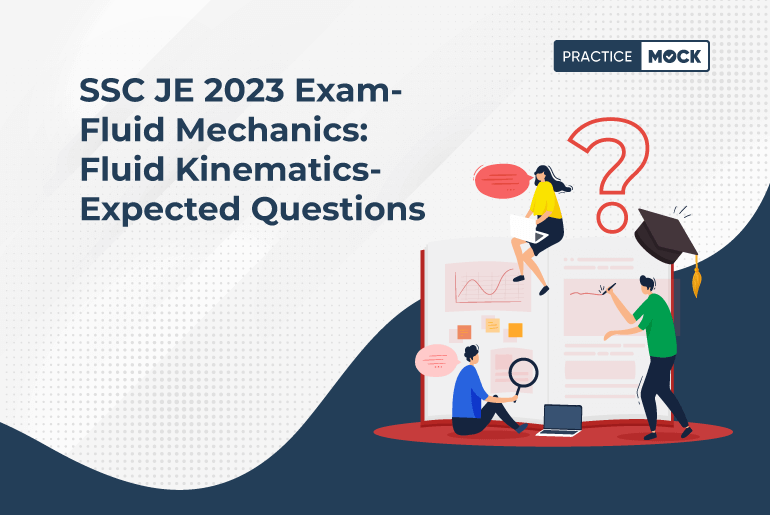Do you know how fluids move? Fluids are things like water, air, or oil that can flow. Fluid kinematics is a part of fluid mechanics that studies how fluids move. Fluid kinematics looks at how fast, how far, and in what direction each fluid particle goes, but not at the forces that push or pull them.
Today, we’ll provide you with the 5 most expected questions on Fluid Mechanics!
Take a Free Mock Test & Know Your AIR!
Also read: SSC JE 2023 Exam-Power Plant: Babcock-Wilcox Water Tube Boiler
Fluid Mechanics: Fluid Kinematics
- The line traced by a single fluid particle as it moves over a period of time is called :
(a) Line of force (b) Filament line
(c) Flow line (d) Path line
Ans – d
The line traced by a single fluid particle as it moves over a period of time is called path line.
· A path line is a curve traced by a single fluid particle during its motion.
2. A fluid flow in which the density of the fluid does not change during following is called as :
(a) Incompressible (b) Uniform
(c) Compressible (d) Non-linear
Ans – (a)
A fluid flow in which the density of fluid does not change during the flow is called incompressible flow.
3. A stream tube represents:
(a) a line traced by a particle of fluid during its movement over a period of time
(b) an imaginary line, tangent to which at any point gives the direction of the velocity of the flow of a fluid
(c) an open channel flow
(d) an imaginary tube formed by a group of streamlines passing through an area in a flowing fluid
Ans. (d) : A stream tube represents an imaginary tube by an infinite number of stream lines passing through an area in a flowing fluid.
* Equation for streamline flow through stream tube–

4. Steady flow occurs when–
(a) Pressure does not change along flow
(b) Velocity does not change
(c) Conditions change gradually with time
(d) Conditions do not change with time at any point
Ans. (d) : A flow is said to be a steady flow if fluid properties do not vary with respect to time at any given section, otherwise the flow is unsteady.
For steady flow

5. Non-uniform flow occurs when
(a) the direction and magnitude of the velocity at all points are identical
(b) the velocity of successive fluid particles, at any point, is the same at successive periods of time
(c) the magnitude and direction of the velocity do not change from point to point in the fluid
(d) velocity, depth, pressure etc. change from point to point in the fluid flow
Ans. (d) Non–uniform flow occurs when velocity, depth, pressure etc change from point to point in the fluid flow.
SSC JE 2023 Mock Test for Ultimate Practice
FREE SSC JE Civil Engineering 2023 Mock Test: Are You Ready for the Challenge? Find Out Now!
FAQs-Fluid Kinematics
Q. What is fluid kinematics?
Fluid kinematics is the study of the motion of fluids without considering the forces that cause the motion. It focuses on describing how fluids move and deform, involving concepts like velocity, acceleration, and flow patterns.
Q. Why do fluid kinematics are studied?
Fluid kinematics are studied to understand the behavior of fluids in various applications like engineering, meteorology, and biology. This knowledge helps in designing efficient systems, predicting fluid behavior, and optimizing processes.
Q. Which method is commonaly used in fluid kinematics?
The method commonly used in fluid kinematics is the Eulerian approach, where fluid properties are observed at fixed points in space over time, allowing for the analysis of flow patterns and changes in velocity.
Q. What are the different fluid principle?
The different fluid principles include Bernoulli’s principle (relating pressure and velocity in fluid flow), Pascal’s principle (transmission of pressure in confined fluids), and Archimedes’ principle (buoyancy in fluids).
Q. What is the langrangian approach in the fluid kinematics?
The Lagrangian approach in fluid kinematics involves tracking individual fluid particles as they move and deform in a fluid flow. This approach provides insights into particle trajectories, displacements, and deformations, giving a more detailed view of fluid behavior.
- Sign Up on Practicemock for Updated Current Affairs, Free Topic Tests and Free Mini Mocks
- Sign Up Here to Download Free Study Material
Free Mock Tests for the Upcoming Exams
- IBPS PO Free Mock Test
- RBI Grade B Free Mock Test
- IBPS SO Free Mock Test
- NABARD Grade A Free Mock Test
- SSC CGL Free Mock Test
- IBPS Clerk Free Mock Test
- IBPS RRB PO Free Mock Test
- IBPS RRB Clerk Free Mock Test
- RRB NTPC Free Mock Test
- SSC MTS Free Mock Test
- SSC Strenographer Free Mock Test
- GATE Mechanical Free Mock Test
- GATE Civil Free Mock Test
- RRB ALP Free Mock Test
- SSC CPO Free Mock Test
- AFCAT Free Mock Test
- SEBI Grade A Free Mock Test
- IFSCA Grade A Free Mock Test
- RRB JE Free Mock Test
- Free Banking Live Test
- Free SSC Live Test


